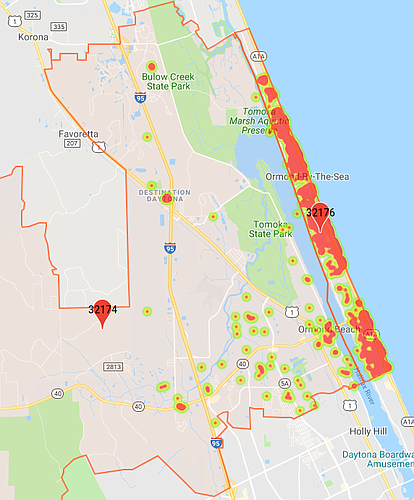- April 18, 2024
-
-
Loading

Loading

Airbnb and VRBO, which work with homeowners to rent out their properties, have begun collecting and remitting local resort taxes on behalf of its hosts in Volusia County. The resort tax is required to be paid by all tourist lodgings. In the past, the county has depended on homeowners to self-report.
Critics have said many homeowners who rent out their homes don’t pay the tax, which supports local marketing efforts and the Ocean Center. But even though they’ve now agreed to pay the tax, other controversies remain.
Hoteliers complain about losing occupancy to short-term rentals. Some rentals operate illegally in areas zoned residential and sometimes code enforcement is called. But those who rent out their houses cite property rights, and say home rentals fill a need in tourism and add value for the homeowner and community.
An article in the July 19, 2019 Ormond Beach Observer reported that Ormond Beach is a growing area for short-term rentals, even though they are only zoned for east of State Road A1A and not permitted in residential areas. Addresses in the ads on Airbnb are not provided, but descriptions reveal they are in residential areas.
The agreement between the county and Airbnb was reached on Feb. 1 and with VRBO last December. Airbnb now has bed tax agreements in place in 44 of the 67 Florida counties. Airbnb announced recently that its Florida host community collectively made $1.2 billion in supplemental income in 2019, while welcoming 6.6 million travelers within the state.
“We’re proud to continue growing our tax collection partnerships in Florida and ensure that counties can enjoy the valuable revenue that vacation rentals bring to the area,” said Tom Martinelli, Airbnb’s Florida Policy Director, in a press release.
HOTELIERS COMPLAIN
Bob Davis, CEO and president of the Lodging and Hospitality Association of Volusia County, said it’s great they are paying taxes, but many operate in zones where they are not permitted.
“If I open a bordello and pay taxes does that make it legal?” he asked.
“If I open a bordello and pay taxes does that make it legal?”
BOB DAVIS, Lodging and Hospitality Association
Though the companies will pay taxes, they will not reveal the addresses, according to Kevin Captain, spokesman for Volusia County. He said the county will continue to seek rentals in areas not zoned for them.
Davis is in favor of the Daytona Beach Police Department acquiring software, Host Compliance, to get the address of houses rented through Airbnb and other companies. A city spokeswoman, Susan Cerbone, said the city is reviewing the software, which would cost a little more than $100,000.
“Not knowing the addresses means they can’t be inspected by the city,” Davis said. “Are they up to code?”
In addition to hurting the hotel industry, Davis said housing used for short-term rentals could be used for housing for workers. He said he knows of a group of workers at one hotel who commute from Flagler County.
“It does not make sense to spend millions attracting industry, when there is no place for workers to live,” he said. “There’s no affordable housing.”
A recent, informal count by a reporter showed about 15 oceanfront hotels in Ormond Beach. Jennifer Wagner, assistant general manager of the Coral Sands, said she agrees with Davis that the rentals have a negative impact.
Ormond Beach City Commissioner Dwight Selby said another concern is that Airbnb reports the tax in bulk, without saying how much is coming from each property, raising the question of accuracy.
Asked about the software that locates addresses, Selby said “that’s a lot of money,” and believes Daytona Beach probably has far more rentals than Ormond Beach.
The state house of representatives is currently considering a bill to prevent local municipalities from having their own rules about short-term housing, but as written the bill will not affect Ormond Beach because its rules would be grandfathered in.
Selby said he opposes any efforts by the state to prevent home rule.
A recent editorial in the Miami Sun Sentinel criticized the state effort to set all the rules. The editorial said local rules are made to prevent residential properties from operating as businesses and destroying the character of neighborhoods.
A HOMEOWNERS’ VIEW
According to the Ormond Beach Neighborhood Improvement Division, there were 19 complaints of STRs in 2018 and 34 in 2019 in the city which resulted in code enforcement action.
But those who rent out their homes say there are benefits to the community.
An Ormond Beach homeowner who does not want to be identified said short-term rentals provide experiences to vacationers that are unique. Large families can stay together and have a garage to store bikes and cars.
He said he has invested thousands of dollars in improving his property and has one of the best houses on the street.
“I pay all county and state taxes on my short-term rentals. I have no patience for those that don’t! I strongly support the right of property owners to do with the property as they chose. There are plenty of laws that I, and others like me, will hold ourselves to, like noise ordinances and total occupant levels,” he wrote in an email.
He said if Volusia County doesn’t change with the times, visitors will go to other parts of the state that welcome them. Also, the rentals provide income which is spent locally.
“We need short term rentals. A bigger market lifts all boats,” he wrote.